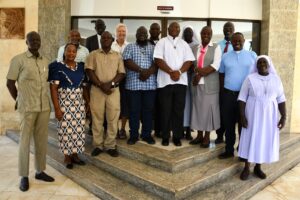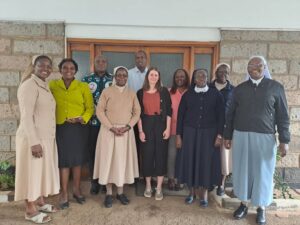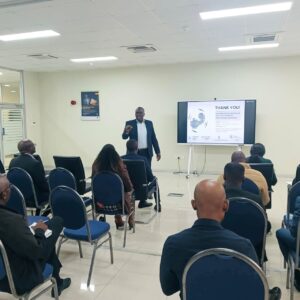UGANDA: Catholic Bishops caution government and security agencies on arrests of opposition leaders and supporters
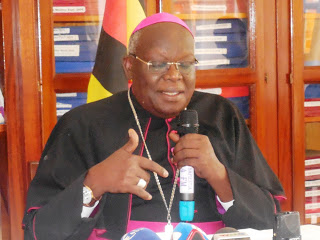
Archbishop Odama addresses members of the press at a recent press conference that was held at the Catholic Secretariat.
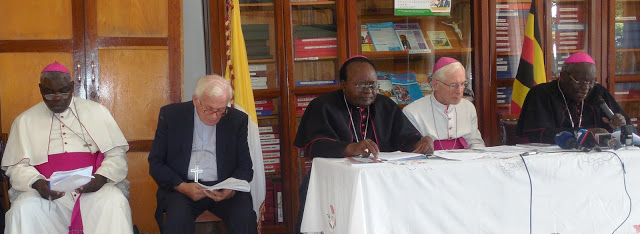
The Uganda Episcopal Conference (UEC) has expressed concern over the numerous arrests of opposition leaders and supporters and violent clashes among members of the population, especially between the opposition and security agencies following the announcement of the presidential election results in February, 2016.
The Catholic Bishops noted that many of these people (opposition leaders and supporters) are not being given the justice that the laws of Uganda prescribe.
“The highhanded treatment of political opponents and the arrests of their supporters no doubt breed feelings of injustice and intolerance, especially when Uganda is still grappling with nurturing its young multiparty political system. We would like to emphasize that political parties remain fundamental pillars of democracy and therefore lawful political activities should be respected,” read the statement that was issued on Tuesday, June 14 by the Chairman of UEC, Most. Rev. John Baptist Odama, Archbishop of Gulu on behalf of the bishops.
They also called upon the opposition leaders to ensure that they operate within the limits of the law, and to respect the rights of every Ugandan.
The statement was agreed upon in the Bishops’ plenary meeting, which took place from June 6-10, 2016 in Kampala. During the meeting they discussed many issues concerning the Catholic Church in Uganda, including the concerns of the people regarding the political tension in the country after the 2016 general elections.
The Bishops further challenged the government to put into practice the message that Pope Francis delivered to the Government Authorities and Diplomatic Corps at State House, Entebbe, shortly after his arrival on November 27, 2015.
“Pope Francis described the Uganda Martyrs, both Catholics and Anglicans, as true national heroes who, among many other things, remind us that, despite our different beliefs and convictions, all of us are called to seek the truth, to work for justice and reconciliation, and to respect, protect and help one another as members of our one human family. In fact, the Pope’s words and his presence among us gave us hope that we could go through the incoming elections in a new spirit of unity, mutual respect, freedom and peace,” he explained.
Prior to the general elections, the Bishops released two pastoral letters that urged all Ugandans, including state agencies, to work for peace before, during and after elections. However, they noted that after the previous various sets of elections in Uganda, despite what appeared to be a generally peaceful electoral environment, it is evident that a situation of uncertainty continues to hover over many parts of our Country.
“Many people appear to be unhappy, discouraged and bitter, as if hope for a better and a more united country had been lost,” Archbishop Odama said adding that. “The road towards Uganda’s political and leadership challenges are clearly stipulated in the preamble of the 1995 Constitution of the Republic of Uganda. The preamble underscores our concerted efforts and further commitment to building a better future by establishing a socio-economic and political order through a popular and durable national constitution based on principles of unity, peace, equality, democracy, freedom, social justice and progress.”
They warned the judiciary over the indirect pressure put on them by the government which is being used to solve disputes that ordinarily require a political solution as opposed to legal interventions. According to the Bishops the judiciary should exercise the independence expected of it under Article 126 of the Constitution and to dispense justice without fear and favor so that justice is not only done but seen to be done.

at a recent press conference that was held at
the Catholic Secretariat.
The bishops further said there was unnecessary clampdown on fundamental human rights and freedoms citing an example of the nationwide shutting down of social media and subsequently banning of the press from reporting certain political activities.
“A free media is a sign of free and democratic society, which the government must respect as a partner institution in strengthening democratic governance,” Archbishop Odama stated.
Meanwhile, the UEC made several proposals and recommendations to the new government, the parliament of Uganda, the judiciary as a template of justice and the citizens of Uganda. They appealed to the new government to respect the rule of law and constitutionalism as key pillars for democratic governance and urged all political leaders to explore democratic dialogue for the electorate to discuss their grievances openly at various levels as a strategy to promote political accountability.
To the new Parliament, they urged them to consider undertaking the needed constitutional reforms as one of their priority tasks and to enact laws which are just and do not undermine or contradict the traditional or Christian values for the protection of life and marriage, as in the case of abortion and divorce. While they called upon all citizens to maintain law and order and desist from any form of violence.
They also recommended that the various stakeholders start dialogue on some of the key governance questions with a view of arriving at consensus on issues such as: the composition of the Electoral Commission; reinstating of the term limits and continuous dialogue between the ruling party and the opposition political parties.
By Jacinta W. Odongo, Media Officer, Uganda Episcopal Conference
